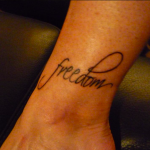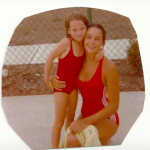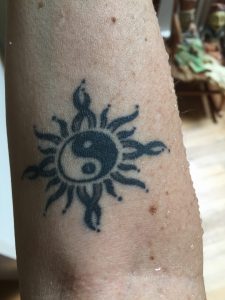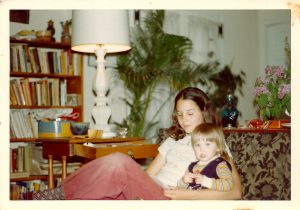They say if you get one tattoo you won’t be able to stop, but so far I’ve only gotten two. The first one is on my right ankle and it spells out the word freedom, though at the time I got it, I had no idea how prescient that would prove to be. I had taken Metro-North into New York City to meet my youngest sister, Alison, in the East Village, the whole trip deliberating what I was going to have needled into my skin, forever.
The word itself was never in doubt, but rather what language I would choose. I had some notion that if I wrote it in Hebrew it would have a more graphic, illustrative look and people would have to ask me what it meant. It would also identify me as belonging to a certain tribe—and belonging to something, truly belonging and being connected, happens to be a lifelong, potentially unfulfillable desire of mine.

But the closer I got to the city the more pretentious and ridiculous that felt. Not only that, but the word freedom is not as easily translated as you’d imagine. Hebrew is an ancient language and apparently freedom is a fairly modern invention. There is the word Hofesh, which is free not freedom, and that would have been like having “summer vacation” tattooed on my ankle. Not what I was going for.
And there is the biblical word Herouth, free from slavery, which was a little closer but still did not exactly capture why the word freedom was so important to me.
To me, freedom is what it is to be an artist—what it requires to be one. Or at least that’s what my father taught me. And I love my father fiercely.
Right or wrong, true or false, good or bad, my father taught me to be an artist. He assured me that whatever is swirling around you, sucking you down or tearing you apart, there is always Art. It is the one thing no one can take away from you. And that is the ultimate freedom.
Talk about pretentious.
So how can I explain my need to write a memoir that opens with the blurry aftereffects of a suicide attempt, after having published thirteen semi-autobiographical middle grade and young adult novels? After achieving relative success, even some well-respected honors for my work. Why this?
My father will also say there is nothing more interesting to an artist than his own life, than himself.
Talk about self-centered.
Talk about narcissistic.
But this, too, is a matter of interpretation, isn’t it?
I can’t speak to what this means for my father, who is an artist in every sense of the word (my father passed away October this past autumn- I write about that here), but for me, being interested in my life means figuring out how to live it, in the best way possible. For me, this means trying to be a better human being, better mother, spouse, sister, aunt, friend, teacher, neighbor, better world inhabiter. And for me, that means being a truth-seeker.
I do know that every book, every story, every poem I have ever written was born of my past, and that I have sometimes wielded my pain and my ego, like a paint brush and like a sword. I also know that before there were my words, I found truth in the words of others; books and stories, and lyrics that spoke to me, spoke for me. When I was young, I would sometimes copy down the words to a song I loved and had memorized, watching the letters appear from the tip of my pen onto the clean white paper, where they became visible and since I could see them, I could hear them as if for the first time.
When I was first practicing my handwriting on that wide-lined thin grayish paper, I saw each letter of the alphabet as having its own unique personality, and groups of letters standing together as a family. L, M, and N were clearly related. L was a girl. M was a boy and N was their baby. Lower case D and lower case B were twins that had sadly been forced apart at birth. Z and Q were independent. T was brave. S was powerful. Vowels needed to be protected, their magic fragile and infinite.
I gave this linguistic wonder to one of my characters, Jason Blake, a twelve-year-old autistic boy who loves, mostly, to write stories. In another of my books, Leah Baer is struggling with issues of abandonment and loneliness when she discovers poetry as a way to feel slightly better about her situation than she did before. Not enough to resolve everything, or anything, but enough to give her hope.
Of course, none of this answers the question I just posed for myself.
Why write a memoir?
If I look back over my fiction writing, it is all firmly based—as opposed to “loosely based”—on my experiences, although always set in contemporary times. But there is no one book where I tell the whole story; rather I broke it into pieces, into several stories, making it more accessible, more digestible, if only for my own consumption. So I could figure out each story—as Anne LaMott famously puts forth—bird by bird.
Also interesting (to me, anyway) is how each biographical character I fabricated was more of their “better” selves than their truthful selves. Without telling the whole of it, the characters needed to be softened, their motivations re-skewed—in particular, the alter-egos of Gabby-Leah-Caroline-Mia- Jason-Sergio-Natalie-me. I always made myself more, well, for lack of better word, likable. Nicer. Remember, I was writing for children, so a forced watering-down and filtering was necessary, but in an odd way, it also made me duplicitous.
Writing it down as memoir—warts, bruises, puke, shit and piss—makes it real. Writing it down makes it visible, and shows me things I hadn’t seen before. Writing it down, so I can hear the truth of it, as if for the first time.
And publishing it.
So if anyone wants to deny its accuracy they finally and fully can. Publishing it, so I can hold it in my hands, and throw it away.
* * * * *
When I met my sister in the city that afternoon, at a tattoo parlor called East Side Ink, I was a work in progress myself, still far from free.

But I didn’t choose the word freedom as in freedom from any external manifestations. It was freedom from myself. Freedom to be myself. Ironically, and erroneously, freedom from my past.
The day I chose that word, something was changing within me, I just didn’t know what it was at the time. “Freedom” came before the embodiment of it. I grabbed it, before I understood what it meant, what it could mean. What it had to mean, if I was to survive.

I got my second tattoo, with that same sister, at the same place, just over a year later, shortly after being released from the hospital after trying to kill myself. Once again, I knew exactly what I wanted inked into my right forearm: the sun, with a simple yin-yang symbol inside.
I had learned how to draw the yin-yang when I was a kid living in Woodstock in the late 1960s. The hippie icon was everywhere, along with peace signs and images of Che Guevara. What fascinated me about the yin-yang was how the white circle is nothing more than the absence of darkness, and the dark circle is only visible with the light around it. You don’t actually draw the tiny circle inside either one, you allow it to become visible—depending of course on what color paper you are using. I used to practice drawing that symbol over and over, in the corners of school papers, on the covers of my notebooks, in my doodles and decorations.
In writing, this yin-yang technique is called juxtaposition: two things laying side by side so that meaning is found between the lines, in the white space, in not what is said but rather in what isn’t. In which scene follows the scene before. And the scene after. What becomes visible by virtue of where it is placed. Only by drawing darkness can lightness be truly seen. And vice versa.

My sister got the birth dates of her two boys inked—in Roman numerals—onto her skinny rib cage (Lord, did that look like it hurt). And for myself, around my yin-yang tattoo, I wanted delicate rays of the sun which is not part of the traditional Chinese symbol. I just thought it looked better, felt better, would be better, to be closer to the sun.

Amy koss
June 4, 2018 - 7:36 pm ·I’m so glad you’re writing this. I already feel less alone.
Nora
June 8, 2018 - 11:11 am ·As I do when I read your work..and did from the first book of yours I read. It just what we do, I suppose.
Pam Warren
June 5, 2018 - 1:41 am ·Bird by bird – 🙏🏻
Nora
June 8, 2018 - 11:09 am ·Yes..always! I also love Stephen King’s On Writing.
Anne Broyles
June 5, 2018 - 8:03 am ·I am haunted by your eloquence and courage.
Nora
June 8, 2018 - 11:08 am ·Coming from you my friend…means so very much. thank you.
Debbie Katchko Gray
June 5, 2018 - 10:47 am ·I’d like to be in touch! I’ve always loved your writing and of course your spirit. We had great years in Norwalk raising our boys! I will keep reaching out and hope we can reconnect one day
Love you and hope your journey brings you more peace, joy and sunshine
Nora
June 8, 2018 - 11:08 am ·I’d love to..!
Julie DeMicco
June 5, 2018 - 4:31 pm ·I love your writing and what you have to say. So happy when this blog appears in my inbox.
Nora
June 8, 2018 - 11:07 am ·Julie..thank you. More than you know. If writing itself is healing, then knowing they reached another person is peace.
Gae Polisner
June 7, 2018 - 2:18 pm ·Every time I read your writing, I selfishly thing to myself, “And I am her writing PARTNER on projects” and I smile. Love you and your beautiful words. . . and heart.
Nora
June 8, 2018 - 11:05 am ·Right back at you my friend.